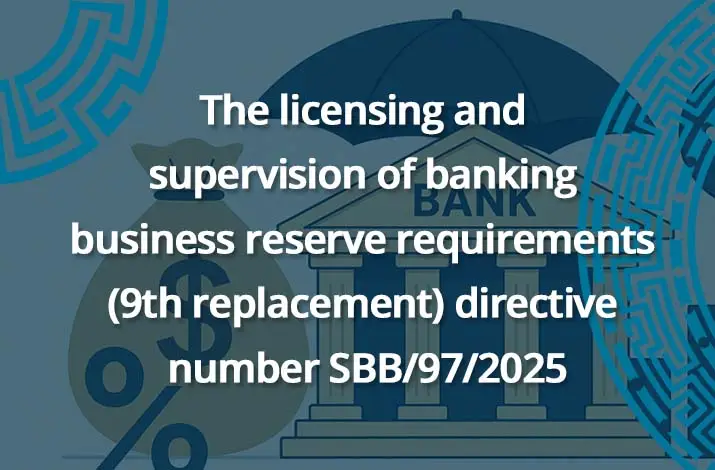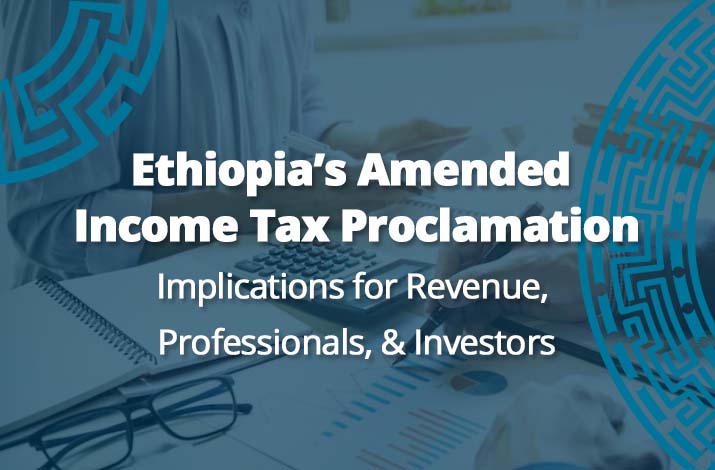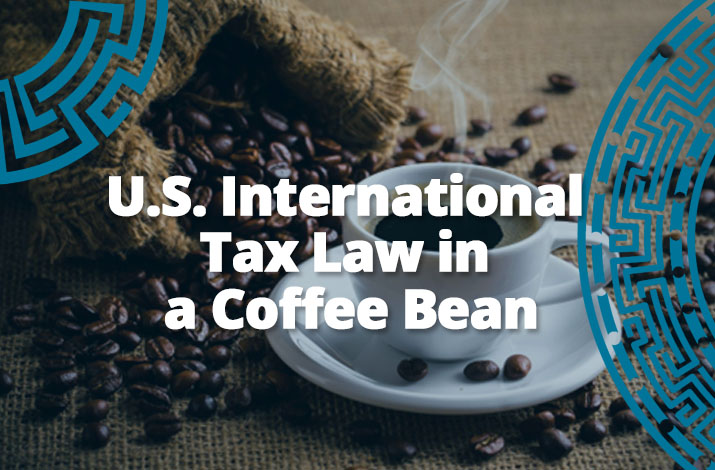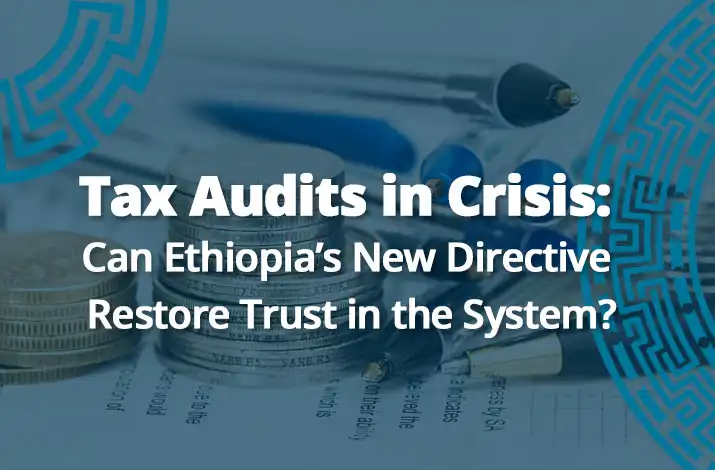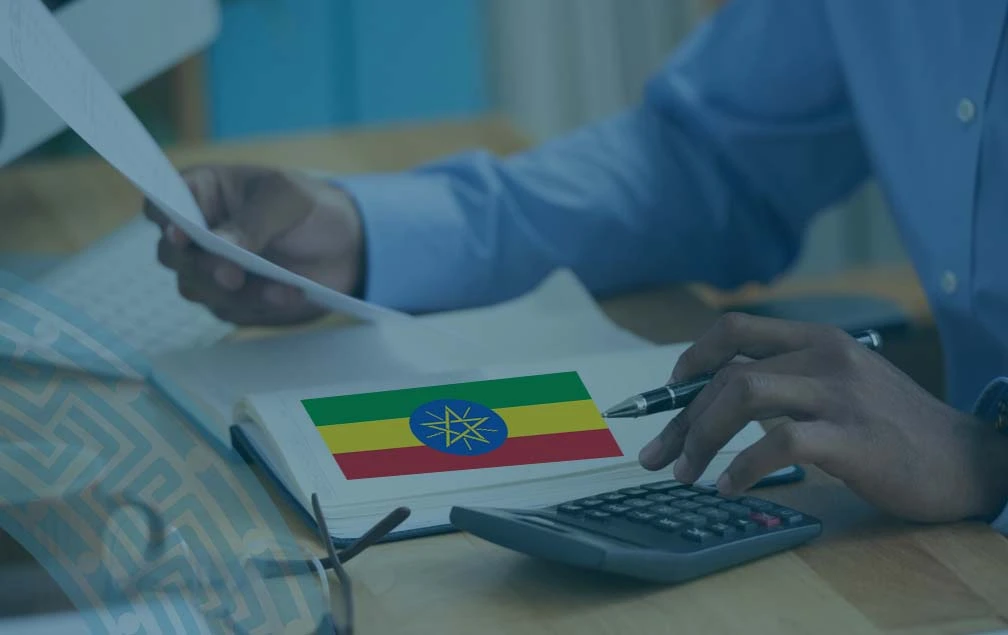Major Changes in Ethiopia’s VAT Regime
On June 27, 2016, during its 36th regular meeting, the House of Peoples Representatives ratified Value Added Tax (VAT) Proclamation No.1341/2016, by replacing Proclamation No.285/1994. The Proclamation became effective immediately upon its approval.
The proclamation incorporated substantial updates in the VAT proclamation, it tried to address changes in economic activities, electronic transactions, tax exemptions, and the relationship between input and output tax, and aligned the system with existing global standards. It is made to create clear and effective legal frameworks that contribute to an efficient implementation of VAT within the national legal system.
The legal reform highlights significant adjustments to the Ethiopian VAT regime, and the major changes made due to the revision at this moment are as stated below:
-
- Under the prior proclamation, VAT was limited to taxable supplies made within the territory of Ethiopia. The new proclamation, however, adopts the “destination principle,” which extends VAT liability to supplies of goods and services sourced from outside Ethiopia when consumed by individuals within the country. It is even applicable on supplies made by foreign entities lacking permanent establishments (PE). This is clearly stated under articles 3(1) and 7 sub article 1(c) of proclamation as reverse charged supply. The concept of reverse charged supply (it could be either continuous or periodic) is relevant for the supply made by entity residing and carrying on business outside Ethiopia to registered person in Ethiopia.
- Reverse charged supply under previous proclamation was restricted only to supplies of goods or services rendered physically. Conversely, Article 6 of the new proclamation broadens its scope to encompass services provided regardless of the supplier’s registration status or geographic location, including cases where the supplier operates outside Ethiopia without a permanent establishment. This provision applies to services rendered to VAT-registered persons, governmental bodies, or larger unregistered entities. It covers services that would have been subject to VAT if supplied domestically, provided that the service received is used in a taxable activity and is not exempt from VAT.
- Supplies rendered through electronic transaction, is one of point of focus for the new proclamation as e-commerce proliferating these days. In contrast to previous proclamation which only subjects physical transaction to taxable activity, the new proclamation under article 23 clearly incorporates supplies rendered solely or with the involvement of electronic transaction by individuals or entities without having permanent establishment. Consequently, suppliers are liable for VAT on goods ordered electronically, provided certain legal criteria are met. In these circumstances, the foreign operator of the electronic marketplace is deemed the supplier and is responsible for the VAT liability.
- The tax collection mechanism requires registered persons, government bodies, or substantial unregistered persons who receive taxable supplies directly from foreign sources to withhold and remit the VAT to the relevant tax authority.
Furthermore, suppose the supply is made to individuals or entities not required to register for VAT. In that case, the foreign supplier must either register directly or designate a tax representative in Ethiopia to ensure compliance with VAT regulations. - Under the previous proclamation, services not delivered through a physical presence in Ethiopia were not recognized as services rendered within the country. However, Article 24 of the new proclamation provides that taxable activities conducted outside Ethiopia by persons without a permanent establishment will be deemed supplied within Ethiopia when the service is delivered remotely to persons residing in Ethiopia. This includes services related to package tourism, representation, or registration services associated with package tourism, among others.
- The previous proclamation lacked a clear definition of the transaction price, which in effect led to tax disputes. Article 5 of the new proclamation addresses this by defining the transaction price as the total consideration or fair market value, including deposits, service charges, duties, and other taxes (excluding VAT). However, in the case of credit purchases or finance leases, finance charges are excluded from the transaction price.
- The updated proclamation restricts VAT exemptions to final products with a valid rationale, primarily benefiting low-income communities. The authority to grant VAT exemptions has shifted from the Ministry of Finance to the Council of Ministers, resulting in many previously exempt items being subject to taxation.A) Financial Services: VAT exemptions are determined by the nature of service rather than the provider. Essential functions such as loan issuance and currency exchange are exempted, while other services remain taxable.
B) Insurance Services: Only long-term insurance products, specifically life and health insurance, remain exempt; while other types of insurance premiums and compensation become subject to VAT.
C) Transport Services: Public transportation services are exempt from VAT, except small vehicles (having less than eight seats), rentals, and tourist-related services.D) Electricity and Water Services: Households consuming up to 200 kWh of electricity and 15 cubic meters of water monthly are exempt from VAT; however, higher consumption levels and all commercial usage are taxable.
- Under the previous legislation, VAT registration in Ethiopia was mandatory for individuals or companies conducting taxable transactions within the country, with a threshold of ETB one million or consistent activity over 12 months. Voluntary registration was required over 75% of transactions with VAT-registered persons. Articles 12 & 13 of the new proclamation show that the mandatory registration threshold to ETB two million in taxable supplies within 12 months. It obliges Foreign Service providers without a permanent establishment in Ethiopia to register for VAT, expanding the registration requirements beyond local entities. Those applying for voluntary registration must have completed at least ETB one million transactions with VAT-registered persons within the same timeframe.
- Previously, taxpayers engaged in transactions exceeding ETB 70 million were obligated to file and remit taxes each month, whereas those with transactions below this amount were required to do so quarterly. The new legislation requires all taxpayers to file declarations and remit collected taxes on a 30-day cycle.
- Article 28 of the new proclamation introduces a VAT deferral for importers of capital goods, which is not present in prior legislation. If the importer meets the specified conditions, the customs commission may allow VAT deferral, potentially requiring a guarantee. However, this deferral does not apply to capital goods imported for resale by registered individuals in taxable business activities.
- An electronic marketplace enables the delivery of services and goods remotely via digital platforms. Under previous proclamation, VAT was not levied on electronic transactions, resulting in unregistered taxpayers that negatively impacted traditional traders. According to the new proclamation’s Article 25, if the primary supplier is not registered, the operator of the electronic platform is obligated to VAT registration. When the supplier is abroad, the foreign supplier or their appointed tax agent must register for VAT. If neither is registered, the obligation for reverse tax collection may be imposed on the buyer.
- The distribution of cards and supplies of telecommunication services complicates tax collection due to diverse societal involvement. The previous law treated telecom services VAT like other transactions, leading to ambiguity. Under the new proclamation, article 38 states that telecom providers must collect VAT on the total price once, ignoring agent discounts, and agents are exempt from VAT.
- Under previous law, transactions by agents for principals were not separately regulated; preventing agents from acting directly on behalf of principals, and VAT was applied to each transaction. However, Article 41 of the new proclamation considers that any supply by an agent is made by the principal, with the agent as the tax representative. Thus, supplies to agents are treated as supplies to the principal.
- Under previous legislation, any registered person had to pay VAT and issue a receipt immediately upon making a supply, even if the payment had not been received, with no provision allowing tax adjustments or refunds for uncollected receivables. This was especially challenging in industries like construction, where VAT had to be remitted to the tax authority upon issuing an interim payment certificate, even if the receivable remained uncollected after legal measures. This led to compliance issues and tax disputes. The new legislation addresses this by allowing adjustments for uncollectible debts: Articles 45 and 46 of the proclamation permit a refund of output tax if the receivable remains uncollected after legal efforts. Additionally, if any amount is later recovered, the registered person must remit the output tax during that collection period.
- VAT applies to self-supply used in non-deductible activities.
- Used goods purchased from unregistered suppliers are eligible for input tax recovery.
- In Game of Chance, VAT is calculated based on profit, not receipts, with no input refund.
- Forfeited deposits are taxed as completed supplies.
- Rights, options, and vouchers (excluding unspecified vouchers) are taxable as services.
- Employee benefits provided as taxable supplies are assessed at fair market value.
- VAT applies to debtor assets sold by financial institutions to settle debts, whether or not the debtor is registered.
- Article 25 of the previous legislation required the tax authority to set special tax conditions for sectors like lotteries, travel agencies, commission sales, and others, as detailed in Directive Nos. 2/1996 and 21/1997. These directives caused compliance issues and disputes, as they imposed requirements beyond existing legislation. The new legislation (Articles 32-42) resolves these issues by clarifying VAT special conditions:
- Under the previous law, tour operators paid VAT only on their commissions when using third-party services, but the new proclamation now requires VAT on the full transaction price. However, transitional provisions specify that registered tourist guides will pay VAT on domestic package tourism earnings (excluding accommodation, meals, and transport costs) based on the remaining balance or commission for three years from the proclamation’s effective date.
- The calculation of VAT net payment was unclear under previous legislation. Article 47 of the new proclamation clarifies that the tax owed for an accounting period will be calculated using the A-B formula, where A is the total VAT accrued, including VAT withholding credits, reverse VAT paid by buyers, and permitted capital goods VAT deferrals, and any output VAT. The registered person pays the total input tax for eligible input purchases, represented by B.
- Articles 29 and 30 of the new proclamation establish the criteria for input tax deductions, permitting registered persons to deduct input tax incurred on taxable supplies at the time of supply or importation, except where disallowed. For purchases related to taxable and non-taxable supplies, the deductible input tax is determined using the formula A×B/C, where A represents the total input tax, B denotes the value of taxable supplies, and C signifies the total value of all supplies. When the B/C ratio is 0.95 or higher, the input tax will be fully deductible and if the ratio falls below 0.05, no deduction is permitted. Input tax deductions must be recorded in the accounting period if the supply or import occurs. However, the deduction may be claimed in the subsequent period if relevant documentation is unavailable. Additionally, when an input tax deduction is omitted from a VAT return, it can still be claimed within 12 months following the original accounting period.
- Articles 48 to 51 of the new proclamation outline three types of VAT refunds: carry forward of excess input tax, refunds without carry forward, and refunds for diplomatic missions, international organizations, and foreign investors. For excess input tax, if the input tax surpasses the supply tax in an accounting period, it is carried over for up to six periods; after that, a refund can be requested, and processed by the tax authority within 45 days. If 50% of a registered person’s supplies are zero-rated, or if taxable supplies exceed ETB 100 million and involve capital goods, the tax authority must process the refund within one month of the application. If a person cancels their registration, they must apply for a refund within the last period or lose eligibility.Taxable supplies to foreign governments, diplomats, international organizations, and certain foreign investors may be VAT-exempt or refundable under international agreements or Investment Incentive Regulations, with refunds processed within a month of the request.
- Under Article 51 of the proclamation, if the refund account is not settled within the legally stipulated time frame, it bears interest which must be paid by the tax authority from the end of the relevant period until the refund is issued; it is calculated at the maximum interest rate offered by banks in Ethiopia for commercial loans.
- The recent proclamation and draft regulation introduce new types of VAT receipts and documents previously unavailable, including original tax receipts, simplified tax receipts, recipient-issued receipts, and creditor-issued receipts for goods, electronic fiscal device-generated VAT documents, VAT documents from registered foreign suppliers, and VAT documents for agent-conducted supplies. Each registered person may issue one receipt per taxable supply, with one credit or debit document for adjustments. The detailed conditions for each type are specified in the proclamation and draft regulation.
- A registered person is required to maintain the following documents; All original tax receipts, credit documents, and debit documents received; if the original receipt is lost, a copy of the document prepared as per the proclamation; all copies of receipts and documents; the customs document for imported goods and if there is a tax receipt for the directly taxable supply made by the buyer.
- The tax authority is authorized to recover any unpaid tax, including applicable interest and penalties, from the recipient if they have engaged in a tax-free or zero-rated supply, or if VAT remains unremitted due to the provision of incorrect information or fraudulent conduct by the recipient.
- A person authorized to register goods that necessitates owner registration will not be registered unless the person importing these goods into Ethiopia presents a customs document that verifies the VAT payment or confirms their exemption from VAT.
- A registered person who fails to display the VAT certificate at their place of business, neglects to provide VAT information during electronic transactions, does not notify the tax authority upon ceasing taxable supplies, or fails to issue an invoice or document for each transaction, not including VAT in the prices they provide, etc. will incur a penalty of one hundred thousand ETB.
- Taxable activities conducted by branches and operational units are regarded as a single taxable activity. They are expected to be registered under the company’s name rather than that of the individual branches or units. However, upon a written request from a registered person who fulfills the necessary criteria, registering as an independent entity for each branch or specific business class, or the taxable activities conducted separately may be permissible for them.
- The price quoted or advertised by a registered person for a taxable activity must encompass VAT, which should be explicitly indicated in the advertisement or the stated price; prices cannot be presented as exclusive of VAT.
- In instances of death, insolvency, bankruptcy, or when a mortgagee takes possession of the registered person’s property, the appointed receiver or the mortgagee will be considered to have continued the taxable activities of the registered person and will bear responsibility for the associated tax obligations.
- All amounts must be expressed in ETB. Any monetary amounts stated in foreign currency, except for imported goods, will be converted to ETB at the exchange rate established by the National Bank of Ethiopia on the day they are included in the accounting period or calculation.

